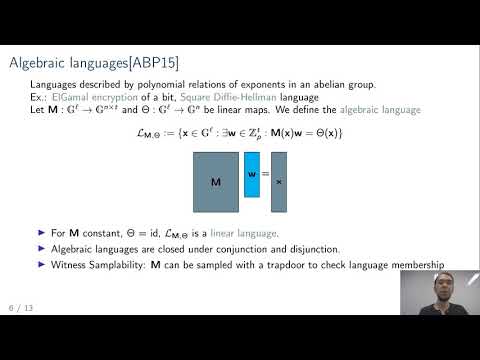CryptoDB
Shorter Non-Interactive Zero-Knowledge Arguments and ZAPs for Algebraic Languages
| Authors: |
|
|---|---|
| Download: |
|
| Conference: | CRYPTO 2020 |
| Abstract: | We put forth a new framework for building pairing-based non-interactive zero-knowledge (NIZK) arguments for a wide class of algebraic languages, which are an extension of linear languages, containing disjunctions of linear languages and more. Our approach differs from the Groth-Sahai methodology, in that we rely on pairings to compile a Sigma-protocol into a NIZK. Our framework enjoys a number of interesting features: - conceptual simplicity, parameters derive from the Sigma-protocol; - proofs as short as resulting from the Fiat-Shamir heuristic applied to the underlying Sigma-protocol; - fully adaptive soundness and perfect zero-knowledge in the common random string model with a single random group element as CRS; - yields simple and efficient two-round, public coin, publicly-verifiable perfect witness- indistinguishable (WI) arguments(ZAPs) in the plain model. To our knowledge, this is the first construction of two-rounds statistical witness-indistinguishable arguments from pairing assumptions. Our proof system relies on a new (static, falsifiable) assumption over pairing groups which generalizes the standard kernel Diffie-Hellman assumption in a natural way and holds in the generic group model (GGM) and in the algebraic group model (AGM). Replacing Groth-Sahai \NIZKs with our new proof system allows to improve several important cryptographic primitives. In particular, we obtain the shortest tightly-secure structure-preserving signature scheme (which are a core component in anonymous credentials), the shortest tightly-secure quasi-adaptive \NIZK with unbounded simulation soundness (which in turns implies the shortest tightly-mCCA-secure cryptosystem), and shorter ring signatures. |
Video from CRYPTO 2020
BibTeX
@inproceedings{crypto-2020-30430,
title={Shorter Non-Interactive Zero-Knowledge Arguments and ZAPs for Algebraic Languages},
publisher={Springer-Verlag},
doi={10.1007/978-3-030-56877-1_27},
author={Dominik Hartmann and Geoffroy Couteau},
year=2020
}

